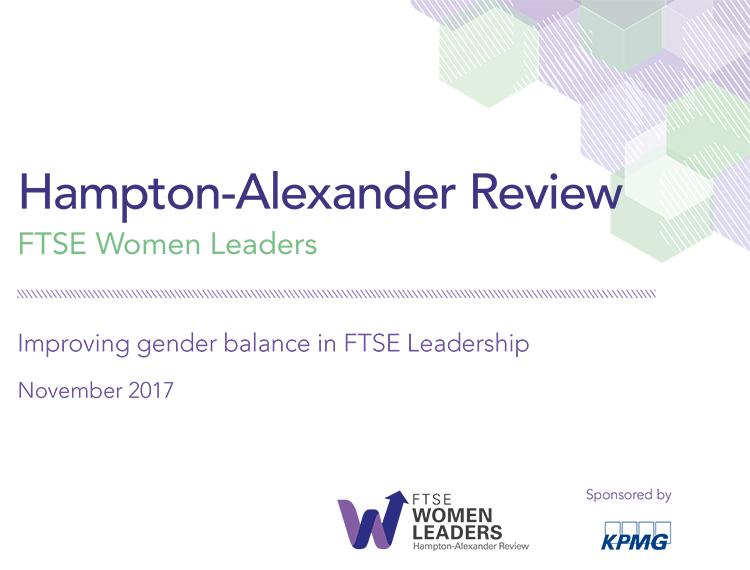The Hampton-Alexander Review

The Hampton-Alexander Review first report was published today (9 Nov). The Hampton-Alexander Review, was commissioned by the government to look at ways to ensure talented women at the top of business are recognised, promoted and rewarded.
The Hampton Alexander Review is an independent review body which builds on the excellent work of the Davies Review to increase the number of women on FTSE boards and with an important new focus to improve women’s representation in senior leadership positions.
Although gender balance on FTSE Boards has undergone a significant shift in the last five years, it is clear there is still more work to do and to sustain progress, appointing more women in leadership roles below the Board, remains the complex and longer-term challenge.
The Review will continue the voluntary business-led approach, joining all stakeholders together in action to improve the number of women on FTSE Boards and in leadership positions.
The Review aims to ensure business benefits from a balance of different perspectives and recruitment practises are based on skills, experience and performance, enabling women to play a full role at the top of British business.
Hampton-Alexander will continue to build on progress made in recent years, driving FTSE Boards to achieve the 33% target by the end of 2020. The new focus will be to improve the number of women in leadership positions, particularly on the Executive Committee and direct reports to the Executive Committee in FTSE 350 Companies.
The key recommendations were:
- 33% target for women on FTSE 350 Boards by the end of 2020;
- 33% target for women on FTSE 100 Executive Committees and Direct Reports to the Executive Committee on a combined basis by 2020;
- FTSE 350 companies to increase number of women roles of Chair, Senior Independent Director and into Executive Director positions on their boards.
The review report published today shows that progress has been made, with almost 28% of board positions in FTSE 100 companies are occupied by women – up from 12.5% in 2011. In that time the number of all-male FTSE 350 company boards fell to just 10 from 152.
This means that, with continued efforts, FTSE 100 companies are on course to meet the review’s 33% target for women on boards by 2020.
However, there is still much more to do, which is why Sir Philip Hampton today called on FTSE 350 companies to quicken the pace of change on boards and extended the 33% target to senior leadership positions of all FTSE 350 companies. Previously this voluntary target only applied to FTSE 100 firms. He said that at least 40 per cent of appointments to senior positions will have to be filled by women over the next three years if FTSE 350 firms are to hit the ambitious targets.
 Education Secretary and Minister for Women and Equalities Justine Greening said:
Education Secretary and Minister for Women and Equalities Justine Greening said:
Tackling inequality in the boardroom and ensuring more women get into senior leadership positions is not just good business sense, it is vital to our economy.
It is great to see some of our top companies really stepping up to address gender imbalances on their boards. We are making progress, but there is still a long way to go.
That is why we all need to do our bit to improve workplace equality. The government is continuing to work with business to help remove the barriers that can hold women back in their careers. This includes being one of the first countries in the world to require all large employers to publish their gender pay and bonus data.












Responses